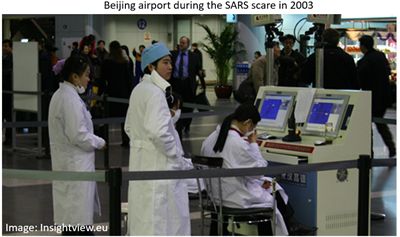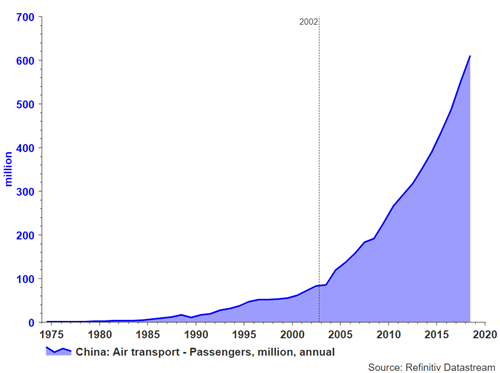A short note on the risk of a pandemic caused by a new strain of coronavirus in China - The difference from the Sars-outbreak in 2003
This is a follow-up and extended version of the Insightview article,
A short note on the new strain of coronavirus in China, published on January 21.
In early January, Insightview began showing links to a "mystery virus" in China in the daily
Morning Briefing emails. The Chinese authorities immediately ruled out that this could be a new strain of the coronavirus, Sars. [Read the DW article,
China rules out Sars as dozens struck by pneumonia-like virus.] A few days later, the World Health Organisation, WHO, linked the virus to the "
Sars family".
In this context, there is a significant risk that this could turn into a pandemic, as millions of Chinese are now travelling to their hometowns for Lunar New Year celebrations, thereby boosting the probability of spreading the virus. This has indeed reminiscence of the “Sars scare” in 2002-2003 when an outbreak in the Guangdong province caused more than 8,000 to be infected worldwide. Nearly 800 people died. [Fatality rate of close to 10%.] On the other hand, this does not have to represent a repetition of this outbreak, provided Chinese policymakers play with open cards this time around.

At first glance, this appears to be the case, as it seems that Beijing has learned the lesson from 2002-2003 when policymakers tried to hide information from the general public. At that time, the outbreak started in November 2002, but China did not notify the World Health Organization (WHO) until February 2003. This time, the outbreak started in December 2019, and the notification from the Chinese authorities came in January.
Also, the Chinese authorities are today acting more decisively. Earlier this week, the Central Political and Legal Affairs Commission said on its website that "anyone who puts the face of politicians before the interests of the people will be the sinner of a millennium to the party and the people.” [Read the SCMP article,
China warns Communist Party officials: cover up spread of Wuhan virus and be ‘nailed on pillar of shame for eternity’.] On January 22, Wuhan [population: 11 million], the epicentre of the outbreak, was quarantined, according to a
tweet from China Daily.

It is difficult to predict the outcome of a possible pandemic. In 2003, China, Hongkong and Taiwan were hit hardest with 5328, 1755 and 346 cases, respectively. That said, other countries with a large population of Chinese migrants suffered as well. This applied to Canada, in particular, with 251 cases and 44 deaths. [See the WHO source
here.]
At first glance, there is no reason to exaggerate the current situation. Today, the fatality rate appears to be only 2%-3%. Also, the Chinese authorities are supposedly much better prepared than in 2003. Nonetheless, it would be foolish to ignore the risk, as an outbreak in China could spread to the rest of the world at a much faster pace than in the past. Today, the number of Chinese tourists travelling abroad is significantly higher than in 2003.
In 2018, outbound Chinese tourists stood at 150 million compared to only 20 million in 2003. Thailand and Japan are the top destinations for Chinese tourists during the Lunar New Year, according to China’s leading travel agency, Ctrip. The fact is that Chinese tourists are travelling all over the place. [Read also the MarketWatch article,
CDC confirms one case of coronavirus in the U.S.]
Furthermore, the WHO and the Chinese authorities have already concluded that the new coronavirus is
transmitted between humans. The health authorities are, therefore, nervous about a new super-spreader, like the one that made Sars spread rapidly in 2002-2003. Today, the total number of cases is around 700, but the real number could already be close to 4,000, according to the
MRC Centre for Global Infectious Disease Analysis.
A pandemic could have significant short-term consequences for the travel sector, luxury companies and a global supply chain which already faces headwinds from a global trade war. That said, this will be short-lived unless the health authorities, against all odds, fail to rein in the problem. Nonetheless, this is certainly not positive news for the global stock market, although several pharmaceutical companies will benefit from a pandemic. In addition, the virus emerges at an unfortunate time, as the global manufacturing sector shows only tentative signs of improvement. To read more about the issue, take a look at an excellent BBC article,
Coronavirus: How worried should we be?
21. January 2020 - A short note on the new strain of coronavirus in China







 At first glance, this appears to be the case, as it seems that Beijing has learned the lesson from 2002-2003 when policymakers tried to hide information from the general public. At that time, the outbreak started in November 2002, but China did not notify the World Health Organization (WHO) until February 2003. This time, the outbreak started in December 2019, and the notification from the Chinese authorities came in January.
At first glance, this appears to be the case, as it seems that Beijing has learned the lesson from 2002-2003 when policymakers tried to hide information from the general public. At that time, the outbreak started in November 2002, but China did not notify the World Health Organization (WHO) until February 2003. This time, the outbreak started in December 2019, and the notification from the Chinese authorities came in January. It is difficult to predict the outcome of a possible pandemic. In 2003, China, Hongkong and Taiwan were hit hardest with 5328, 1755 and 346 cases, respectively. That said, other countries with a large population of Chinese migrants suffered as well. This applied to Canada, in particular, with 251 cases and 44 deaths. [See the WHO source here.]
It is difficult to predict the outcome of a possible pandemic. In 2003, China, Hongkong and Taiwan were hit hardest with 5328, 1755 and 346 cases, respectively. That said, other countries with a large population of Chinese migrants suffered as well. This applied to Canada, in particular, with 251 cases and 44 deaths. [See the WHO source here.]